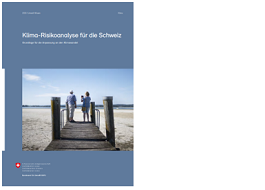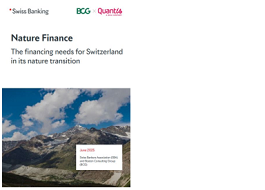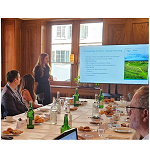| |
|
|
| |
|
|
| |
|
SSF Newsletter June 2025
|
| |
|
Bouncing Back
|
| |
|
Dear Sir or Madam,
|
| |
|
Since the mid-20th century, our societies have witnessed demographic and socio-economic changes of a magnitude and a pace that are unprecedent in human history. These changes are often referred to as the “Great Acceleration”. In a single human lifetime, we have seen steep surges across many indicators: from global GDP and energy use to CO₂ concentration, ocean acidification, and biodiversity loss. The fast-growing resource consumption led to an imbalance between resource consumption and resource renewal that cannot be sustained indefinitely.
Businesses and consumers have to adopt sustainable development practices to give our societies a change to perpetuate. And sustainable finance has the potential to play a driving role in achieving this transition.
Being a sustainable finance specialist is however not always easy, these days. “ESG backlash” is the prevalent term to describe the current headwinds sustainability topics are currently facing – the idea of a general scepticism with regards to the benefits of sustainable investing.
Against this backdrop, it was reinvigorating to witness the unchanged engagement and energy at our Annual Conference on 17 June in Bern, where more than 200 driven and committed sustainability professionals joined us for inspiring speeches from prominent speakers, such as Andréa Maechler from the BIS or Hans Hess from Synhelion (and many more that we cannot all name here individually).
We were also pleased to see the results of the “Swiss Sustainable Investment Market Study 2025”, that we published on 23 June: figures show that sustainable investment volumes significantly bounced back in 2024. A majority of market participants seems to remain convinced that it offers value and makes business sense to take sustainability factors into account.
Let’s all take these positive messages into the summer break, to come back with new energy and the continued ambitious to build a sustainable economy for our societies.
|
|
| |
|
|
Kind regards
Romain Leroy-Castillo
SSF Director Projects
|
| |
|
|
|
| |
|
|
| |
| |
| |
|
SSF activities at a glance
|
| |
|
| |
|
SSF Annual Conference 2025
|
| |
|
Thank you to the over 200 of you that joined us on 17 June 2025 for the SSF Annual Conference in Bern! The afternoon included a keynote from Andréa Maechler, Deputy General Manager at the Bank for International Settlements (BIS), Stefan Walter, CEO of FINMA, and other esteemed speakers. Read a summary of the event and view some photos on our website.
|
| |
|
|
|
| |
| |
|
Swiss Sustainable Investment Market Study 2025 Published
|
| |
|
|
|
|
| |
| |
|
SSF welcomes 4 New Board Members
|
| |
|
At the Members' Assembly 2025 on 17 June in Bern, four new finance executives were elected to the SSF Board. View their profiles here. We welcome each and every one of them and are happy to build on their expertise going forward! Read the press release here.
|
| |
|
|
|
| |
| |
|
Webinar series: “Sustainable Investing - Here to Stay”
|
| |
|
We had over 100 participants in the first edition of new webinar series “Sustainable Investing – Here to Stay”, covering the topic “Effect of Climate Risk on Performance”. We discussed how integrating climate risks into investment analysis can enhance the risk/return profile of portfolios. Read a summary here. SSF members can access a recording of the webinar. Please note that you must be logged in to access the slides. You can find them here.
|
| |
|
|
|
| |
| |
|
Partnering with organisations
|
| |
|
Over the past month, SSF has contributed to various events organised by other organisations. Contributions have ranged from Veronica Baker, Project Manager – Lead Impact Investing and Nature, speaking at the 2025 Latam-Europe Impact Investing Roadshow, to Romain Leroy-Castillo, Director Projects, participating in a panel discussion at the Crypto Valley Conference. Read a summary of these and other events here.
|
| |
|
|
|
| |
|
|
| |
| |
|
Regulatory and market news
|
| |
|
| |
|
Swiss News
- The revised Swiss Collective Investment Schemes legislation (CISO, in force since 1 March 2024) now allows fund management companies, with FINMA approval, to segregate illiquid assets into "side pockets" in exceptional cases to protect investors and preserve liquidity in the remaining portfolio. This mechanism, prompted by asset freezes following Russia’s invasion of Ukraine, ensures fair treatment for existing investors while enabling the unaffected portion of a fund to remain operational. Read the circular elaborating from the Asset Management Association (AMAS) in English, French or German.
- Norway and Switzerland signed a bilateral agreement to strengthen cooperation on carbon capture and storage (CCS) and carbon dioxide removal (CDR). The agreement was signed during the Longship Launch event in Oslo.
- On 25 June 2025, the Federal Council decided to pause the revision of the ordinance on climate reporting, in line with its March 2025 decision to pause the revision of the sustainability reporting provisions under the Swiss Code of Obligations. The Federal Council will decide on the further course of action once the EU has made its decisions on simplifications, but no later than spring 2026.
Market News
- The newly launched Avoided Emissions Platform (AEP), a global initiative launched by Mirova, Robeco, Edmond de Rothschild AM, I Care by BearingPoint, and Quantis, a BCG company, plans to create a framework for quantifying avoided emissions. The coalition represents USD 4 trillion in assets and aims to foster more transparent communication among regulatory developments and changing shareholder expectations. Read the press release.
- Over 20’000 bonds from more than 3’500 global issuers are represented in the LGX DataHub, created by the Luxembourg Stock Exchange, which now has several new features that highlight sustainable bond data including the 10 most common impact metrics and compliance with the Climate Transition Benchmark (CTB) and the Paris-Aligned Benchmark (PAB).
- TNFD has released final ocean-related sector guidance for the fishing, marine transportation, and cruise lines industries, alongside a discussion paper on measurement of ocean-related issues. These resources respond to growing demand for tailored support in the blue economy and come ahead of the Blue Economy & Finance Forum and UN Ocean Conference.
- Four Regional Councils will be advising the Taskforce on Inequality-related Financial Disclosures in the Americas, Asia-Pacific, Europe & UK, and Middle East & Africa. Their work will help to ensure that the distinct social, economic, and cultural contexts of different regions is understood. Read more here.
- A group of leading Trade Finance banks have announced their endorsement of the International Chamber of Commerce’s (ICC) Principles for Sustainable Trade Finance (ICC PSTF).
|
|
| |
|
|
|
| |
- SSF has launched a free chatbot that lets you ask targeted questions about the Sustainable Investment Market study and instantly receive clear, tailored, and concise answers. Access the chatbot here.
- We’ve just released the German version of our Introduction to Sustainable Finance learning module! This course offers a clear overview of the key drivers and principles behind sustainable investing, explores the main implementation strategies, and highlights how these are being adopted in Switzerland. Enroll for free here.
|
|
| |
|
|
|
|
|
| |
| |
|
SSF and sustainable finance in the media
|
| |
|
|
|
|
|

|
| |
|
Climate Risk Analysis for Switzerland: Basis for adaptation to climate change
|
| |
|
This report by the Federal Office for the Environment (FOEN) identifies and assesses climate risks and climate-related opportunities for Switzerland up to 2060. With the participation of numerous experts from administration, science, and business, the first "Climate Risk Analysis" from 2017 was comprehensively reviewed and updated in terms of content and methodology. The results serve as the basis for the Federal Council's future adaptation strategy and for the development of adaptation strategies and action plans in cantons and regions.
|
|
More >
|
| |

|
| |
|
Financing options for Switzerland’s nature transition
|
| |
|
In its latest report, the Swiss Bankers Association underscores the urgency of scaling up nature-related investment in Switzerland to counter rising environmental pressures, especially in sectors like water infrastructure and sustainable agriculture. As banks begin to incorporate nature-related risks and opportunities into their practices, many initiatives still fall short of financial viability. The report points to the need for stronger demand signals, creative financing solutions and more robust data and metrics to attract private investment.
|
|
More >
|
| |
|
|

|
| |
|
How to Assign Probabilities to Climate Scenarios
|
| |
|
The EDHEC Climate Institute’s report, "How to Assign Probabilities to Climate Scenarios", presents a new framework for estimating the likelihood of future climate pathways. Using empirical mitigation data and economists’ Social Cost of Carbon estimates, the study applies a maximum-entropy method to avoid bias. It finds that the chance of limiting warming to 1.5 °C is just a few percent, with a likely outcome of 2.5 to 2.7 °C by 2100. The probability of exceeding 3 °C is between 20–40%, highlighting serious tipping point risks. The framework offers a more realistic basis for climate stress testing by investors, regulators, and policymakers.
|
|
More >
|
| |

|
| |
|
Climate transition of the financial sector: the state of play in the EBRD regions 2025
|
| |
|
This report surveys 96 EBRD partner banks across 32 economies to assess climate practice integration. Since 2021, climate awareness and green finance adoption have increased, with most banks viewing it as a growth opportunity. However, progress tracking and resource allocation remain challenges. Governance engagement varies, and only 23% of banks have fully developed transition plans. The findings highlight both progress and fragmentation, stressing the need for stronger capacity building and risk management.
|
|
More >
|
| |
|
|

|
| |
|
Finance & Nature Toolbox v1.0
|
| |
|
The Finance & Nature Toolbox v1.0, Partnership for Biodiversity Accounting Financials (PBAF), offers practical guidance for financial institutions – including asset managers, investors, and banks – on integrating biodiversity into every stage of their loan and investment process: from setting priorities, policies, and targets to due diligence, agreement terms, active ownership, and exit decisions. It maps which assessment tools, databases, and publications are most suitable at each stage, helping users choose the right instruments for their biodiversity-related questions.
|
|
More >
|
| |
|
|
| |
|
Would you like to find out more about recent developments in sustainable finance and members-only SSF activities? SSF members receive access to additional resources. Join our growing community to profit from it.
|
|
| |
|
| |
|
Kind regards
The SSF Team
|
| |
|
|
|
| |
| |
|
Already a member or partner? Make sure you are featured on our website. Get in touch with us to upload your member or network partner profile now.
Interested in joining our network of members and partners? > Learn more
|
|
| |
|
| |
|
SWISS SUSTAINABLE FINANCE
|
|
|
| |
|
|
| |
|
|
| |
|
|
| |
|
|
| |
|
|
| | |
















